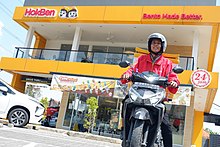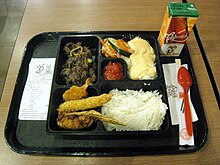| This article uses bare URLs, which are uninformative and vulnerable to link rot. Please consider converting them to full citations to ensure the article remains verifiable and maintains a consistent citation style. Several templates and tools are available to assist in formatting, such as reFill (documentation) and Citation bot (documentation). (August 2022) (Learn how and when to remove this message) |
| Trade name | HokBen |
|---|---|
| Company type | Private |
| Industry | Foodservice |
| Founded | 18 April 1985; 39 years ago (1985-04-18) |
| Headquarters | Jakarta, Indonesia |
| Key people | Paulus Arifin (CEO) |
| Products | Japanese-style fast food |
| Website | www.hokben.co.id |


PT Eka Bogainti, trading as HokBen (formerly known as Hoka Hoka Bento), is an Indonesian chain of restaurants that serves mainly Japanese-style fast food. Headquartered in the Jakarta capital region, the chain of restaurants span nationwide across the Indonesian islands of Java, Bali, Kalimantan, Sulawesi, and Sumatra.
Nomenclature
HokBen is a portmanteau word derived from an early name of the brand, Hoka Hoka Bento, which literally means "steaming bento (Japanese-style takeaway served in box)" in Japanese. It was originally named that way to attract the Japanese expats and the Japanese-enthusiasts in Indonesia.
History
Established on 18 April 1985 in Kebon Kacang, Jakarta, under PT. Eka Bogainti by Hendra Arifin, HokBen became the largest Japanese-style fast food chain in Indonesia. Although they serve Japanese-style fast food, the ownership, management and cooks are entirely Indonesian. There is no Japanese involvement in the business.
In April 2008, the firm had 98 outlets. As of April 2010, there were around 120 outlets, with expansion planned to other Indonesian cities in Central Java, Yogyakarta and Bali. Today, HokBen has 141 restaurant chains in Java and Bali.
Products

HokBen serves various Japanese fast food. However, unlike the common ordering and serving method in most fast food restaurants, HokBen's serving arrangement is set similar to a high school cafeteria where customers move along the line with a tray to collect their dishes. Their menu comprises both set meals and à la carte dishes. Although they define themselves as a Japanese restaurant, most of the food served have been adapted to suit Indonesians' taste. Examples of the change include stronger flavor compared to authentic Japanese food as well as the addition of sambal to cater to Indonesians' preference for spicy food.

HokBen offers a kids' meal package called "Kidzu Bento" which includes toys. They are also able to accommodate for children's birthday parties in their restaurants. The logo and toys offered are based on Hoka Hoka Bento characters.
Mascot
The mascots of HokBen are a pair of adolescent characters named Taro (boy) and Hanako (girl). Both characters appear in the restaurant's logo. It is also used in Japan by New Life Hot Food's.
References
- "Ciputra Entrepreneurship Hendra Arifin, Sang Pemilik Hokben". Archived from the original on 15 March 2014. Retrieved 15 March 2014.
- "Ternyata Hoka Hoka Bento 100% Milik Orang Indonesia Toh…". Archived from the original on 10 August 2011. Retrieved 7 September 2011.
- "Garuda Indonesia serving Japanese fast food HokBen in business class sparks debate online". Coconuts. 5 July 2019.
- "Garuda to serve HokBen on limited domestic flights". Jakarta Post. 30 November 2018.
- http://www.hokahokabento.co.id/?mod=aboutus&opt=vwSub&cid=2&id=1
- ".:: Hoka Hoka Bento Rambah Pasar Luar Jawa | Tribun Jabar Online ::". Archived from the original on 15 June 2010. Retrieved 7 October 2010.
- "Halo Jepang". Archived from the original on 31 March 2012. Retrieved 7 September 2011.
- "HokBen". www.hokben.co.id. Retrieved 6 November 2017.
- "Japanese Bento with indonesian taste - Review of Hoka Hoka Bento - Gambir, Jakarta, Indonesia - TripAdvisor". www.tripadvisor.com.sg. Retrieved 6 November 2017.
- "HokBen". www.hokben.co.id. Retrieved 6 November 2017.
- Media, Kompas Cyber. "Paket Baru Bento Anak - Kompas.com". KOMPAS.com (in Indonesian). Retrieved 6 November 2017.